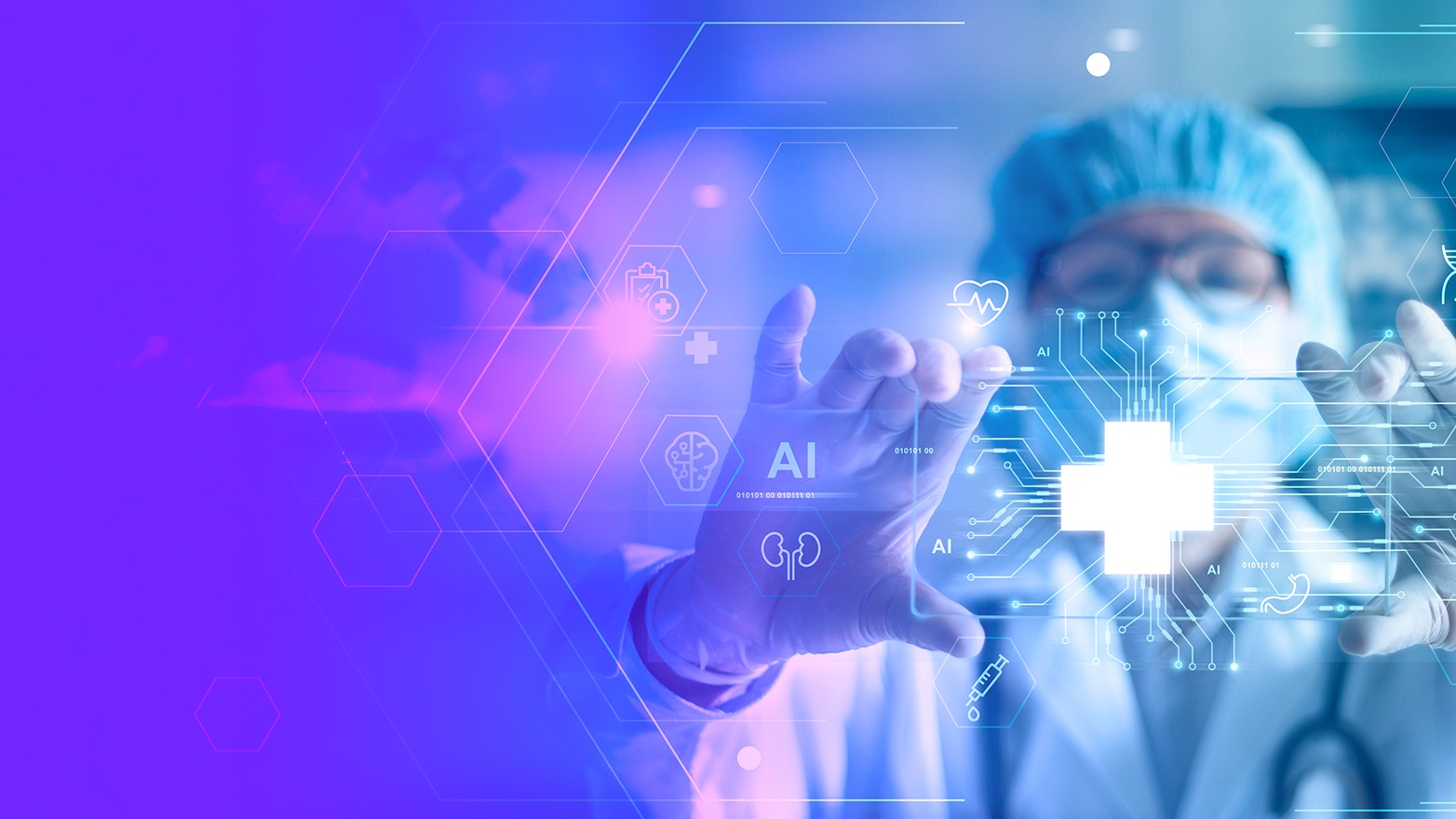Transforming the healthcare workforce
The synergy of AI and the human touch

The healthcare industry stands at a pivotal crossroads, where the integration of artificial intelligence (AI) and the transformation of the workforce are converging to redefine how patient care is delivered. Specifically, AI and Generative AI (GenAI) have the potential to free up workers from mundane tasks, enhance productivity, and improve the patient experience.
Today’s healthcare ecosystem is challenged by workforce shortages and physician burnout. These challenges only stand to increase with an aging population that has increasingly complex long-term healthcare needs. By 2050, one in four people in Europe and North America will be over the age of 65. At the same time, there will be a shortage of 9.9 million physicians, nurses, and midwives globally by 2030, according to the World Health Organization.1
AI offers a potential solution to these issues, providing tools that not only augment the clinician’s role, but also help upskill auxiliary staff. At present, AI adoption in healthcare is picking up steam, with 79% of healthcare organizations reporting that they are currently using AI technology, according to a Microsoft-commissioned study through IDC.2
The healthcare workforce in the age of AI
Beyond the back office: AI on the front line
AI is integral to solutions like telemedicine that expand access to care without inflating costs. GenAI tools like Microsoft Copilot can be used to automate clinical documentation, leading to improved efficiency and allowing physicians to spend more time on patient care. Tasks that can be augmented and streamlined by GenAI include generating discharge summaries, surfacing expert clinical content, creating lab summaries from physician rounds, and synthesizing shift-hand-off notes. It can also be used to improve Electronic Health Record (EHR) functionality, by prepopulating visit summaries and suggesting changes in documentation. When it comes to precision medicine, AI is poised to take this complex area of clinical care to new levels. As AI is trained to find patterns in data and then generate new content, it will be a key tool in culling through the massive amounts of unstructured data scattered across disparate sources in healthcare.
Patient experience and data privacy
Patient experience during physician encounters can be improved using AI tools – often in combination with Cloud – to improve interoperability, generate clinical insights, and enhance care delivery, all in the name of driving more personalized care experiences. With AI-powered tools for appointment scheduling, virtual assistants, and patient monitoring, there is potential to reallocate human resources personnel to higher-level tasks. One of the most critical aspects of healthcare quality is ensuring patient data privacy. Solutions such as those offered by Microsoft Fabric allow healthcare organizations to break down data silos and store patient healthcare data in a unified and secure location where analytics and AI workloads can operate at-scale, all within HIPAA guidelines.
Workforce solutions: Unlocking potential
Investing in AI tools is only the first step; understanding how to extract value from these investments is crucial. Healthcare organizations must deconstruct work to the task level, identifying areas ripe for GenAI augmentation. This approach not only unlocks capacity. but also lays the groundwork for a learning culture that embraces trial and error and rapid upskilling. Critical components of this process include:
- Learning: Establishing a continuous learning environment is vital. It’s not about off-the-shelf solutions but about fostering a culture where upskilling is the norm, and resistance to change is managed through effective change management practices.
- Employee Experience: Enhancing the employee experience is paramount. GenAI offers opportunities to redefine roles, operational models, and talent strategies, preparing healthcare workers for more challenging and engaging tasks.
- Real-time patient monitoring: AI-enabled wearables and real-time monitoring devices are changing the landscape of patient care, enhancing the physician/patient relationships and leading to improved outcomes, even in the face of healthcare worker shortages.
- Human in the loop: Even as AI streamlines decisions at the clinical point of care, it is critical to keep humans in the mix for quality control and fact checking. Physicians need to approach AI-generated treatment plans with a critical eye. This requires a shift in mindset that may be new to many physicians, i.e., requiring them to bring curiosity to customized treatment plans to make sure they are fit for purpose.
In conclusion, the transformation of the healthcare workforce through AI and GenAI is not just about technological innovation; it’s about harnessing the synergy between AI and the human touch to create a healthcare system that is responsive, efficient, and compassionate. As we navigate this transformation, it is imperative to keep the human element at the forefront, ensuring that technology serves to enhance, not replace, the invaluable human connection in healthcare.
1. Global strategy on human resources for health: Workforce 2020, World Health Organization, 2016.
How KPMG Human Capital Advisory Services can help
KPMG Human Capital Advisory Services can provide your organization with innovative, multi-faceted people solutions and insights and drive accelerated, sustainable business performance. Harness our expertise with enterprise organization transformation, innovative talent strategies, HR, payroll, learning function optimization and implementation of all enabling technologies to develop a future-ready workforce that fuels growth and success for your organization. Embrace the future with KPMG Human Capital Advisory and experience a more innovative approach to building an agile, future-ready organization.
Subscribe to Human Capital Real Insights: Delivering in today's world of work
Subscribe to Human Capital Real Insights for access to research, analysis, and events to help you gain strategic insight and position your enterprise for a competitive advantage.
Explore more

GenAI is poised to transform healthcare. Is healthcare ready?
The fast-moving tech’s revolutionary potential promises to redefine a massive industry and its slow-mover history—and the stakes have never been higher.

GenAI is reshaping work and the workforce
Learn how KPMG can help you transition from a technology-centric approach to a human-experience perspective in the age of GenAI.

Optimize your workforce to thrive with GenAI
Elevate your future workforce by blending the best of advanced technology and human ingenuity
Meet our team
KPMG Human Capital Advisory Services provides innovative, multi-faceted people solutions to help organizations navigate the challenges they face today. Work with us to ensure your workforce is future ready.
